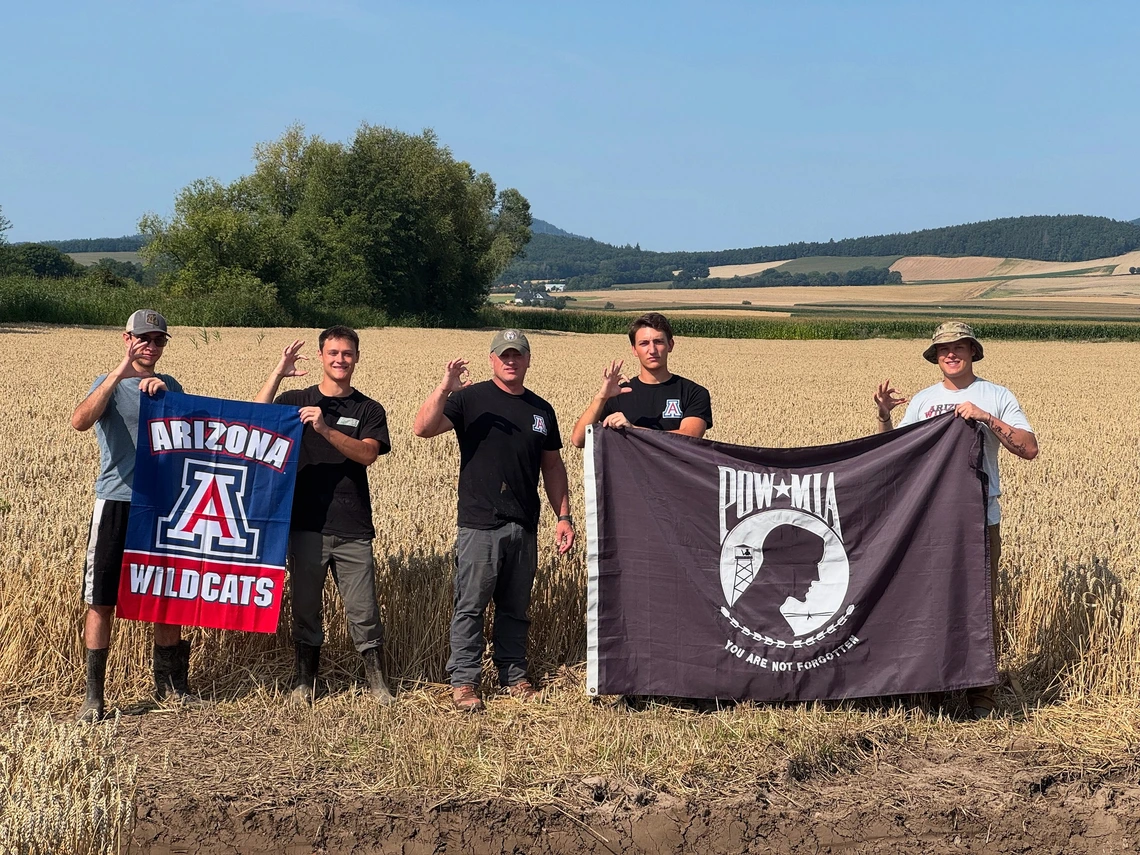Expanding opportunities to honor those who served

From left to right: Max von Husen, Zach Ellwanger, Lt. Col Rich Ingleby, Carson Criswell and Jonny Ellwanger at the dig site in Poland.
U of A Army ROTC
On a quiet farm field in Poland, University of Arizona students spent their summer digging through the soil of a World War II crash site searching for the remains of American airmen lost in the war. For ROTC cadet Jonny Ellwanger, this wasn't just another training program with the university's Army Reserve Officers' Training Corps; it was a chance to bring somebody's grandfather home.
The effort speaks to ROTC's broader mission to engage and serve communities in Arizona and beyond.
The pilot mission

Lt. Col. Rich Ingleby
The mission began when Lt. Col. Rich Ingleby, a professor of military science and department head of the university's Army ROTC, was approached by a representative from the Defense POW/MIA Accounting Agency, or DPAA.
"He's an archaeologist, so he knew our anthropology department well," Ingleby said. "He suggested why not send some of your cadets on a mission this summer?"
Joining the cadets was anthropology student Max von Husen, invited through a partnership between ROTC and the Department of Anthropology. Von Husen had previously done fieldwork at an unrelated site in Poland, so when he received an email about the opportunity to work at the crash site of a B-17G "Flying Fortress" bomber, he jumped on it.
"It's not every day you get to do work like that," said von Husen, "especially with a purpose this meaningful."
A community that cares
While at the site near the village of Glinica, days in the field would blend together. Hours of digging and sifting through dirt in the summer sun could feel endless, but there were moments when something remarkable would be revealed.
"Every so often you'd uncover something like a piece of equipment with a serial number on it," remembered von Husen, "and suddenly it hits you: this was part of someone's story."
It's a story that didn't end when the B-17G fell from the sky. The story of the crash and the lives of soldiers lost continues and lives on within the village community that came together to honor the fallen Americans.
Not far from the crash site stands a small church and inside hangs a memorial to the soldiers who died: a broken propeller adorned with poppies and a small informational plaque in Polish and English, honoring the American crew.

From left to right: Jonny Ellwanger, Zach Ellwanger and Carson Criswell, cadets in the University of Arizona Army ROTC program, sift mud through screens on a farm in southwestern Poland. The cadets, joined by anthropology student Max von Husen, spent a month of their summer working alongside an archeological crew to carefully excavate a B-17G "Flying Fortress" bomber that crashed during the final months of World War II.
U of A Army ROTC
"Standing there, seeing that across national boundaries, it was really moving," said Ellwanger.
Though generations have passed, the sense of connection remains.
"We were out there in this big farm field with Polish archaeologists from the local museum and volunteers from the community," said Ingleby. "They were working just as hard as we were. You could see how much it meant to them. Their level of appreciation for the sacrifices our American service members made was powerful."
Opportunities on the horizon
Since the field mission in Poland began, the remains of two of the servicemen who died have been identified. Moments like these that bring closure to families of the missing may soon become more common as similar missions take shape. Because of the Poland trip, more opportunities for meaningful impact are now on the horizon. The mission was a pilot program for ROTC units nationwide, paving the way for other universities to send their own cadets on similar recovery missions.
Closer to home, plans are underway to give university students the same opportunities for fieldwork, expanding their learning beyond the traditional classroom and offering a shared opportunity to make the world a little better.
"We're building something that connects students from all over campus – anthropology, history, forensics, international studies – and we're going to send them out to make an impact," said Ingleby. "Show me a better experiential learning opportunity for a college student than this. It's something you'll carry for the rest of your life."
For von Husen, the experience was unlike traditional academic archaeology. It was practical, humanitarian work rather than purely research based, and it was also eye-opening.
"The DPAA's work to recover lost soldiers really connects archaeology to something personal and tangible," said von Husen. "It made me think this could be a career path."
Looking ahead
The university is also supporting efforts to establish the Arizona Center for the Missing in Action, which has a fund in place with Donor Services that will be available for donations in the coming weeks. The collaborative initiative with the U.S. Department of Defense aims to provide opportunities for students in fields including anthropology, history and forensics to take part in missions to recover and identify missing service members.
Ingleby said, if everything goes as planned, every student on campus, regardless of financial means, will have the opportunity to recover parts of history while strengthening connections with communities around the world. Designed to be educational experiences and humanitarian efforts, the fieldwork will allow students to step into the past, uncover untold stories, and help provide closure to families of service members who have waited sometimes decades for answers.
For Ellwanger, it is work that is deeply meaningful as well as personal.
"My grandpa's helicopter was shot down in Vietnam, but he made it home. A lot of families never got that chance. That's why this means so much."
Read more about the ROTC recovery mission in Poland in a story on the university's news website.

